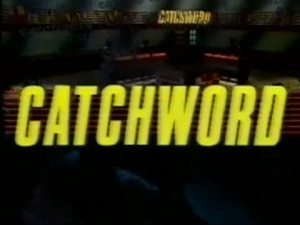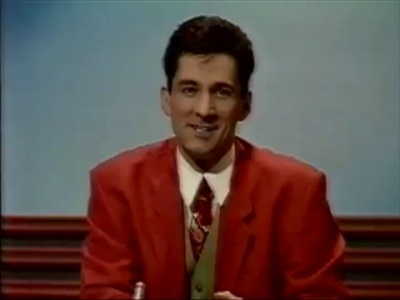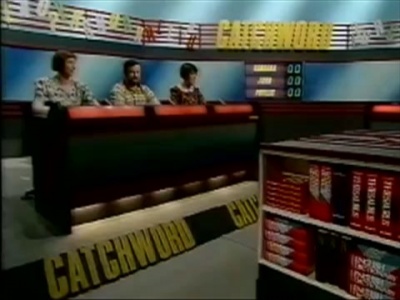Catchword
(→Web links) |
|||
| (13 intermediate revisions not shown) | |||
| Line 13: | Line 13: | ||
BBC1 Scotland, 17 May 1985 to 2 April 1986 (13 episodes in 2 series) | BBC1 Scotland, 17 May 1985 to 2 April 1986 (13 episodes in 2 series) | ||
| - | BBC Scotland for BBC2, 5 January 1988 to 23 May 1995 ( | + | BBC Scotland for BBC2, 5 January 1988 to 23 May 1995 (approx. 440 episodes in 8 series) |
| - | Co-produced by Leslie Mitchell Associates ( | + | Co-produced by Leslie Mitchell Associates (1991-95) |
</div> | </div> | ||
| Line 33: | Line 33: | ||
Winning a match meant you got to pick a reference book from the Catchword library, and winning five games in a row meant winning a bigger prize (an Amiga computer or something similar). | Winning a match meant you got to pick a reference book from the Catchword library, and winning five games in a row meant winning a bigger prize (an Amiga computer or something similar). | ||
| - | Rarely exciting, and it has to be said this wasn't the BBC at its most dynamic. Still, someone must have liked it, given that it lasted for more than seven years. What probably helped was the fact that it was | + | Rarely exciting, and it has to be said this wasn't the BBC at its most dynamic. Still, someone must have liked it, given that it lasted for more than seven years. What probably helped was the fact that it was, up until January 1994, screened at 4pm and finishing at 4.30pm, just when [[Countdown]] was starting, so there was presumably a goodly number of wordsmiths who enjoyed watching both shows every weekday. The second half of the penultimate series swapped places with [[Today's the Day]], which meant that it was shown after [[Countdown]] at 5pm. The final series went out at 5.30pm opposite a teatime repeat showing of ''Neighbours'' on BBC1. |
== Inventor == | == Inventor == | ||
| Line 41: | Line 41: | ||
== Theme music == | == Theme music == | ||
| - | + | The original theme tune was an excerpt from Jean Michel Jarre's ''Orient Express''. | |
== Catchphrases == | == Catchphrases == | ||
| Line 52: | Line 52: | ||
== Trivia == | == Trivia == | ||
| - | |||
| - | |||
It was first made as a Scottish regional programme. The second series apparently replaced something called ''Charles in Charge'' (a spin-off from "Happy Days", for the record) which went out in the rest of the country at that time. Probably a good move. | It was first made as a Scottish regional programme. The second series apparently replaced something called ''Charles in Charge'' (a spin-off from "Happy Days", for the record) which went out in the rest of the country at that time. Probably a good move. | ||
| - | The abovementioned ear-piercing "beep" with each letter was, | + | The abovementioned ear-piercing "beep" with each letter was, from the 1991 series onwards, replaced with a "whoosh" for each set of three - getting rid of the one really annoying element of the show. The 'Joker' image also changed for the better, becoming a very decent coloured image of the joker, much as you'd see one in a pack of playing cards. |
| - | Rather bizarrely, although most series had Coia and the contestants all sitting behind desks (which was far more appropriate, given the nature of the show), the | + | Rather bizarrely, although most series had Coia and the contestants all sitting behind desks (which was far more appropriate, given the nature of the show), the final series had everyone standing up and all the contestants had to join Coia at 'The Pulpit', as he called it, namely a larger desk at the front for all their 'solo' rounds. The latter system seemed like more trouble than it was worth, frankly - maybe it was an attempt to update the show in order to improve ratings, but if so, it seemed to be a failed attempt. |
The computer's name was Bryan, named after the creator of the show Bryan Mitchell who was also in the production team. A strange coincidence, therefore, that Coia's wife, [[Debbie Greenwood]], had also hosted a show, ie [[First Class]], that featured a computer with a boy's name (Eugene, in this case). ''[Coincidence? No, it's a conspiracy, I tell you. One day these anthropomorphised computers will adjudicate over us ALL! - Ed.]'' | The computer's name was Bryan, named after the creator of the show Bryan Mitchell who was also in the production team. A strange coincidence, therefore, that Coia's wife, [[Debbie Greenwood]], had also hosted a show, ie [[First Class]], that featured a computer with a boy's name (Eugene, in this case). ''[Coincidence? No, it's a conspiracy, I tell you. One day these anthropomorphised computers will adjudicate over us ALL! - Ed.]'' | ||
| Line 66: | Line 64: | ||
Catchword was later repeated on BBC Prime. Even better, it was repeated on UK Living from May to September 1996. It's what satellite TV was made for! | Catchword was later repeated on BBC Prime. Even better, it was repeated on UK Living from May to September 1996. It's what satellite TV was made for! | ||
| + | |||
| + | We're not exactly sure how many episodes of ''Catchword'' were made because the show was occasionally overtaken by live events (usually horse racing or extended Westminster coverage), with episodes either shunted later in the afternoon or rolling on to the next day. The ''Radio Times'' for the era lists 462 episodes; we suspect about 440 were made. | ||
== Web links == | == Web links == | ||
| Line 72: | Line 72: | ||
Opening titles from [http://www.ravensbourne.ac.uk/bbc-motion-graphics-archive/catchword-1988 1988], [http://www.ravensbourne.ac.uk/bbc-motion-graphics-archive/catchword-1990 1990] and [http://www.ravensbourne.ac.uk/bbc-motion-graphics-archive/catchword-1994 1994] in the BBC Motion Graphics Archive | Opening titles from [http://www.ravensbourne.ac.uk/bbc-motion-graphics-archive/catchword-1988 1988], [http://www.ravensbourne.ac.uk/bbc-motion-graphics-archive/catchword-1990 1990] and [http://www.ravensbourne.ac.uk/bbc-motion-graphics-archive/catchword-1994 1994] in the BBC Motion Graphics Archive | ||
| + | |||
| + | == See also == | ||
| + | |||
| + | [[Weaver's Week 2023-09-24|Weaver's Week appreciation]] | ||
[[Category:Puzzle]] | [[Category:Puzzle]] | ||
| - | |||
[[Category:BBC Scotland Productions]] | [[Category:BBC Scotland Productions]] | ||
Current revision as of 04:51, 8 February 2024
Contents |
Host
Gyles Brandreth (1985-6)
Paul Coia (1988-95)
Broadcast
BBC1 Scotland, 17 May 1985 to 2 April 1986 (13 episodes in 2 series)
BBC Scotland for BBC2, 5 January 1988 to 23 May 1995 (approx. 440 episodes in 8 series)
Co-produced by Leslie Mitchell Associates (1991-95)
Synopsis
Word game designed to pick up the pre-Countdown audience.
Main game involved a computer who generates three letters (each one with an ear-piercing beep) and you have to come up with the longest word you can think of which contains those letters within a few seconds (Masterteam had used this in their 'In A Spin' round, and Brainteaser were also later to do so in their 'Trio' round). Letter combinations such as "D S M", "T N B", "P T S" and "F H F" let to an unending use of "Disestablishmentarianism", "Tintinabulations", "Pneumonoultramicroscopicsilicovolcanokoniosis", and "Floccinaucinihilipilifications" (the last two of which our spell checker doesn't recognise, bizarrely). One point if the word was valid, and a bonus if you got the longest word out of the three contestants taking part. (Incidentally, the word 'antidisestablishmentarianism' would not have been used, as vowels were never used in the letter-combinations (certainly not in later series), and the first letter shown always had to be the first letter of the word). Incidentally, 'jokers' were used, originally only on occasion for any of the 3 letters, and later de rigeur for the middle letter. They gave the contestants the right to choose any consonant they wished for that position in the word - "Junk the Joker", Coia normally called it.
Other word games included looking for a hidden word in a sentence, anagrams and synonyms.
Winning a match meant you got to pick a reference book from the Catchword library, and winning five games in a row meant winning a bigger prize (an Amiga computer or something similar).
Rarely exciting, and it has to be said this wasn't the BBC at its most dynamic. Still, someone must have liked it, given that it lasted for more than seven years. What probably helped was the fact that it was, up until January 1994, screened at 4pm and finishing at 4.30pm, just when Countdown was starting, so there was presumably a goodly number of wordsmiths who enjoyed watching both shows every weekday. The second half of the penultimate series swapped places with Today's the Day, which meant that it was shown after Countdown at 5pm. The final series went out at 5.30pm opposite a teatime repeat showing of Neighbours on BBC1.
Inventor
Bryan Mitchell, from an idea by Alasdair Alston Adamson.
Theme music
The original theme tune was an excerpt from Jean Michel Jarre's Orient Express.
Catchphrases
"Here come your 3 letters now."
"You need to junk the joker..."
"Will you please join me at the Pulpit?" (final series only).
Trivia
It was first made as a Scottish regional programme. The second series apparently replaced something called Charles in Charge (a spin-off from "Happy Days", for the record) which went out in the rest of the country at that time. Probably a good move.
The abovementioned ear-piercing "beep" with each letter was, from the 1991 series onwards, replaced with a "whoosh" for each set of three - getting rid of the one really annoying element of the show. The 'Joker' image also changed for the better, becoming a very decent coloured image of the joker, much as you'd see one in a pack of playing cards.
Rather bizarrely, although most series had Coia and the contestants all sitting behind desks (which was far more appropriate, given the nature of the show), the final series had everyone standing up and all the contestants had to join Coia at 'The Pulpit', as he called it, namely a larger desk at the front for all their 'solo' rounds. The latter system seemed like more trouble than it was worth, frankly - maybe it was an attempt to update the show in order to improve ratings, but if so, it seemed to be a failed attempt.
The computer's name was Bryan, named after the creator of the show Bryan Mitchell who was also in the production team. A strange coincidence, therefore, that Coia's wife, Debbie Greenwood, had also hosted a show, ie First Class, that featured a computer with a boy's name (Eugene, in this case). [Coincidence? No, it's a conspiracy, I tell you. One day these anthropomorphised computers will adjudicate over us ALL! - Ed.]
Dean Mayer writes: "I took part in the final series of Catchword, finishing runner-up in the grand final. In a bizarre twist, the chap who won - the prize was a lavish overseas holiday - actually died. He had a terminal illness and from what I can gather only the production bosses knew about it. The prize for winning 5 games in a row was a Philips CDi player - remember that one?"
Catchword was later repeated on BBC Prime. Even better, it was repeated on UK Living from May to September 1996. It's what satellite TV was made for!
We're not exactly sure how many episodes of Catchword were made because the show was occasionally overtaken by live events (usually horse racing or extended Westminster coverage), with episodes either shunted later in the afternoon or rolling on to the next day. The Radio Times for the era lists 462 episodes; we suspect about 440 were made.
Web links
Opening titles from 1988, 1990 and 1994 in the BBC Motion Graphics Archive




